#shakespeare meta
Explore tagged Tumblr posts
Text
Romeo & Juliet is NOT a love story and I’m embarrassed at how long it took me to figure that out.
Women in Shakespeare
21K notes
·
View notes
Text
I feel so bad for everyone who decided to read the Iliad after reading Plato, Shakespeare or Madeline Miller because... they lied to yall lol
#the iliad#trojan war#iliad#epic cycle#plato#live from platos cave#the symposium#tagamemnon#shakespeare#william shakespeare#willy shakes#shakespeare meta#shakespeare aesthetic#troilus and cressida#madeline miller#achilles and patroclus#the song of achilles#the illiad#achilles#patroclus
76 notes
·
View notes
Text
Okay, so we all know Charles Dickens was a huge Shakespeare fan and a theatre guy in general. Like, he did so many theatrical productions alongside Wilkie Collins and loved himself some dramatic readings of his own prose.
What I’m saying is that I kind of feel that “A Tale of Two Cities” lifts quite a lot from Shakespeare. For example, in both ATOTC and “Romeo and Juliet”, we have a story about two factions (the two countries of England and France in Dickens’ novel and the two noble houses of Montague and Capulet in Shakespeare’s play) who have been at each other’s throats for so long they don’t even quite remember why they’re at each other’s throats in the first place and what happens when two members of these respective factions (Sydney Carton and Charles Darnay in “A Tale of Two Cities” and Romeo Montague and Juliet Capulet in “Romeo and Juliet”) meet and become close to each other. And of course, both stories end with a desperate person sacrificing themselves for the one that they love with said sacrifice being less a noble and definitive ending to the story and more an act of desperation in the face of impending death (Carton takes Darnay’s place on the guillotine in a desperate attempt to buy Darnay, Lucie, and their daughter time to escape back to London while Juliet commits suicide in what is very likely a desperate attempt to escape from what she still sees as her impending arranged marriage to Count Paris). There’s also a strong parallel between the main character trio in “A Tale of Two Cities” and the main character trio in Shakespeare’s “Twelfth Night”, I.E…
•Both Viola and Charles Darnay are sweet, sensitive young nobles who find themselves living in a new land and assume new names in order to avoid suspicion and end up in a relationship they didn’t expect with the second character of the main trio.
•Both Olivia and Lucie Manette are smart, pious young women living in mourning for a dead or at least severely traumatised loved one and end up falling in love with the disguised protagonist while fending off the attentions of an annoying suitor (Malvolio for Olivia and Stryver for Lucie).
•Orsino and Sydney Carton are both the depressed young men uncertain of their purpose in life who become acquainted with Viola/Darnay while also being in love with Olivia/Lucie.
Where am I going with all this, by the way? Well basically, I’m kind of suggesting that there being queer subtext between Sydney Carton and Charles Darnay might actually have been intentional on Dickens’ part. However, because queerness was so verboten and punishable by prison or death in the 1850s, Dickens had to cloak all of this in ambiguity and subtext, using these allusions to classic Shakespeare plays as a way of coding/broadcasting his true intent to the audience who would know what he was doing.
@cynicalclassicist @eleftherian @secretmellowblog @dachi-chan25 @uncleasriel
#Charles Dickens#Charles Dickens meta#Shakespeare meta#William Shakespeare#Romeo Montague#Juliet Capulet#Romeo and Juliet#Romiet#Viola Twelfth Night#Twelfth Night#Olivia Twelfth Night#Orsino Twelfth Night#Viola x Olivia#Viola x Orsino#Viola of Messalina#Orsino of Illyria#Duke Orsino#Sydney Carton#Charles Darnay#Lucie Manette-Darnay#Cartnay#Cartmanay#Carton/Manette/Darnay#death cw#execution cw#grief cw#child marriage mention cw#prison cw#homophobia cw#spoilers cw
6 notes
·
View notes
Text
The Evolution of Cassandra Cain's Dialogue
Since Batgirl #1 is out and thriving, I thought it'd be fun to dive into the history of Cass' dialogue throughout different writers/runs. This is not comprehensive - I'll miss some writers, but I'll be covering her generally most known runs in mainline continuity (so no DCeased, Shadow of the Batgirl, etc.). Not a linguist by any means, so linguists on here feel free to chime in! (I'll also give opinions on which interpretations I personally prefer at the end).
Without further ado, we'll start at the beginning:
Kelley Puckett - Batgirl (2000)

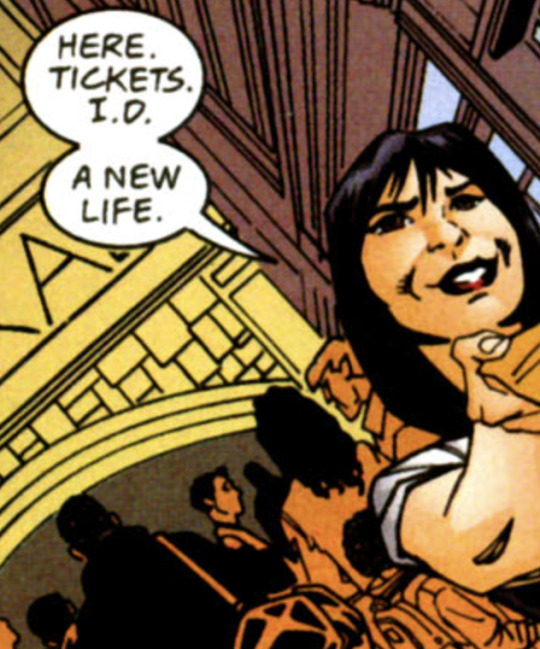

Pre-issue 4, Cass speaks minimally in one-word sentences and doesn't have internal narration. Post-issue 4 (when a metahuman changes Cass' brain), she develops an internal monologue and begins to speak longer sentences. I'm splitting Puckett's Cass dialogue into 3 stages: early, middle, and late.
Early (#4 - #12): Cass speaks short, fragmented sentences. Each word has an ellipses between them (panel 1 above, from #7).
Middle (#13 - #24): Cass continues to speak incomplete sentences (often missing a subject or pronouns), but without ellipses (panel 2, from #13).
Late (#25 onwards): Cass begins to speak complete, simple sentences, punctuated by a few ellipses (panel 3, from #33). She continues to speak grammatically (though slowly) throughout the final part of Puckett's run.
Dylan Horrocks - Batgirl (2000)


Horrocks writes very similarly to late-Puckett, with Cass speaking in full, simple sentences, punctuated by the occasional ellipses. Horrocks introduces two new elements to her dialogue:
Cass stutters, sometimes repeating a word or phrase at the beginning of a sentence (panel 1 above, from #39). This is mostly used in the earlier parts of Horrocks' run.
She quotes reality TV (panel 2, from #51).
Maybe because of the reality TV, Cass also speaks more colloquially here than in Puckett's run, using phrases like "come 'n' get it" (from #57).
Andersen Gabrych - Batgirl (2000)

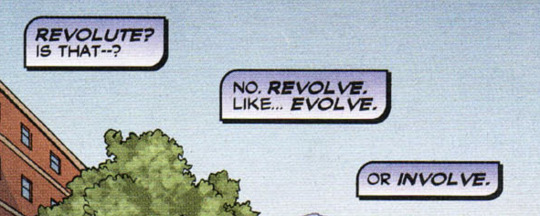
Gabrych's run focuses heavily on Cass' dialogue. Panel 1 above, from #58, suggests her narration boxes are another form of dialogue - Cass is speaking into a recorder. Several features of Gabrych's Cass dialogue are:
Ellipses: Even more than his predecessors, Gabrych scatters ellipses throughout Cass' speech (panel 1).
Fillers: Cass extensively uses filler words such as 'uh', 'um', and 'like' (panel 1, panel 2 from #61).
Longer sentences: Cass is more talkative and speaks longer sentences (panel 1, which is basically more words per panel than Puckett and Horrocks combined).
Wordplay: Cass often ponders definitions and word structures (panel 1, 2).
Adam Beechen - Batgirl (2008)
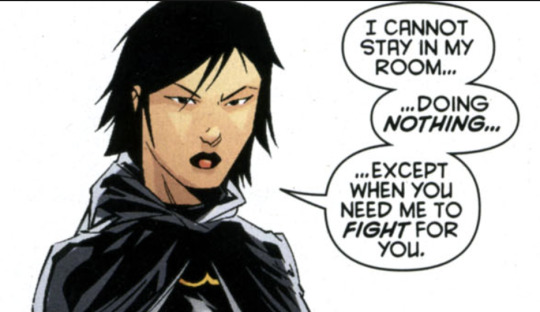

After evil Cass (that dialogue is not worth discussing), Beechen gets another chance with Cass in this miniseries. More than any other writer, Beechen differentiates Cass' internal monologue from her dialogue - her narration boxes are much wordier than her speech.
Her dialogue is a more loquacious version of late-Puckett or Horrocks: full sentences interspersed with ellipses (panel 1, from #1). The ellipses drop off towards the end of the series.
Her narration boxes use a variety of sentence structures and vocabulary. They read more or less as fluent English (panel 2, from #4).
Scott Snyder - Gates of Gotham (2011)
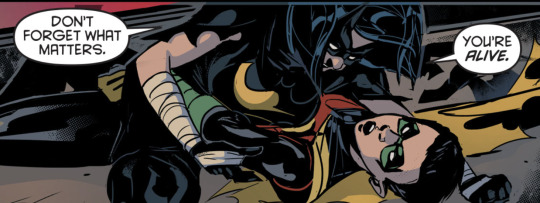

Snyder's Cass somewhat resembles mid-Puckett, using short sentences without ellipses (panel 1, from #2). She speaks a fair amount, but is more taciturn here than in any previous run. This is partially due to her not having narration boxes.
A unique feature of Snyder's Cass is preferring formal to informal speech. Though she uses contractions (panel 1), she goes large stretches without them (panel 2, from #3). She also omits the subject of a sentence only once in 5 issues, whereas native speakers (like Dick) drop the subject all the time ('have you ever been to Paris?' vs. 'ever been to Paris?'; Snyder's Cass would always say the former instead of the latter).
Sidenote: Batman & Robin: Eternal (2015)
Quick note about B&R:E: Cass is reintroduced into canon after being erased by the New 52, which means she's back to having very limited language ability. The series is scripted by multiple people, so it's hard to analyse. Suffice it to say she speaks in monosyllabic words, at most a short, incomplete sentence, but is mostly silent.
James Tynion IV - Detective Comics (2016)

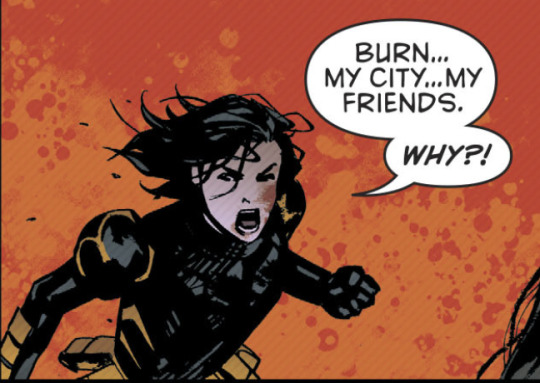
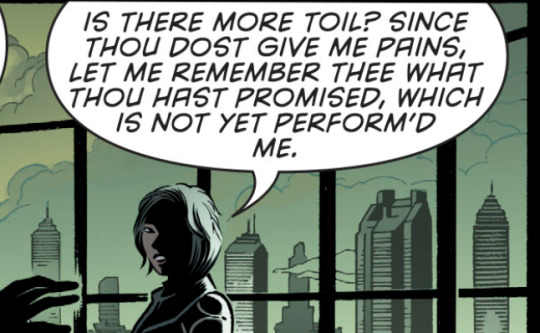
Because Cass' language ability has been reset, Tynion develops her speech along the lines of Batgirl (2000).
Early Tynion has Cass speaking single word sentences (panel 1, from #938). Very similar to pre-metahuman touch Cass in BG (2000).
During the League of Shadows arc, Cass begins to speak a few words at a time, often separated by an ellipsis (panel 2, from #956).
Afterwards, Cass' friendship with Basil Karlo blossoms, leading to this run's most distinctive language feature - Cass improves her speech via studying and quoting Shakespeare (panel 3, from #958). Her improvement is reflected in the rest of the run through speaking longer and more frequent sentences.
Bryan Hill - Batman & The Outsiders (2019)
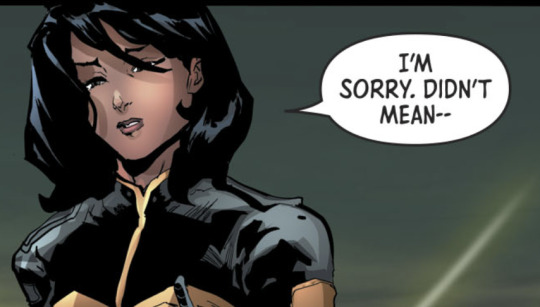
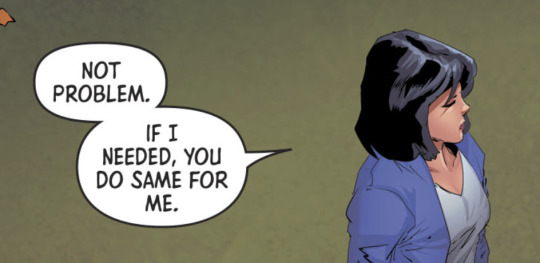

Like other writers, Hill's Cass generally uses short, simple sentences. She frequently drops the subject or pronoun in a sentence (panel 1, from #1). Hill doesn't use ellipses to separate the sentences, opting for periods most of the time.
Cass sometimes omits other words from her sentences too, dropping articles like 'a' and 'the' (panel 2, from #4), prepositions like 'to', and verbs like 'is' (panel 3, from #9). This peters out in the second half of the run.
Becky Cloonan and Michael W. Conrad - Batgirls (2022)

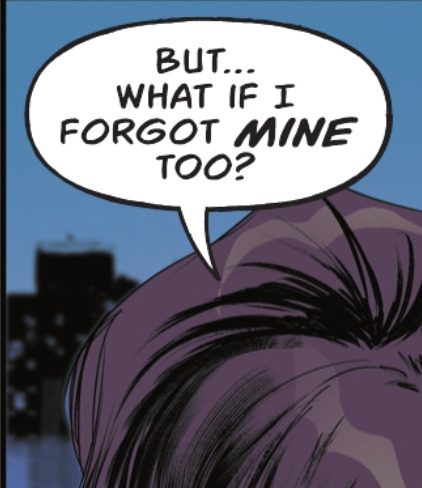
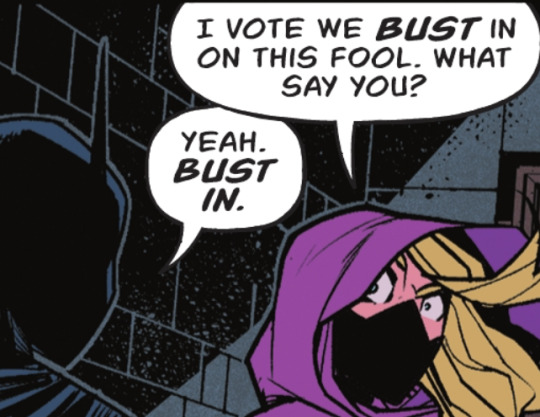
Similar to mid-Puckett, Batgirls has Cass speak mostly in short, 1-2 word sentences (panel 1, from #2). Cloonan and Conrad occasionally use ellipses as well, though mostly for emphasis/natural hesitation rather than indicating a unique speech pattern (panel 2, from #7).
Cass also has a habit of repeating/echoing a phrase Stephanie says (panel 3, from #16). This might be more of a friendship thing than a speech thing, though.
Alyssa Wong - Spirit World (2023)
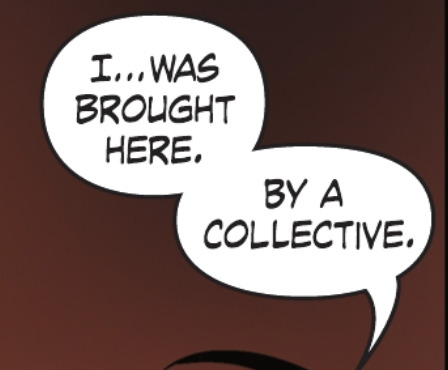

Wong's Cass uses short sentences sometimes interrupted by ellipses, like late-Puckett and Horrocks (panel 1, from #1). Generally, if the sentence is three words or less, there won't be an ellipsis (panel 2, from #5).
Kelly Thompson - Birds of Prey (2023)

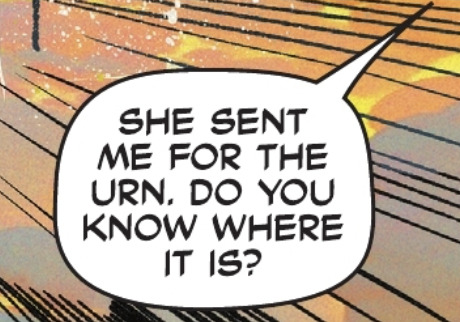
Thompson's Cass draws on a lot of previous iterations, but is somewhat unique as a whole. Some elements of BoP Cass include:
She speaks in sentences of varying lengths, but rarely with more than one clause (panel 1, from #1). Thompson is more strict about not using commas with Cass than most other writers.
Cass is a little more talkative (panel 2, from #5). Her sentences are fairly lengthy compared to most other runs, and she doesn't always opt for the shortest way to say things ('where is it?' instead of 'do you know where it is?'). Thompson also doesn't use ellipses, which adds to the sentences feeling longer/more complete.
BoP is ongoing so Thompson may add more to her speech.
Sidenote: Ram V - Detective Comics (2023)
Putting this in a sidenote since there's not much to say, but Ram V takes after mid-Puckett, with Cass using shorter, incomplete sentences. Cass almost always omits the subject of a sentence; her dialogue is as short as possible while retaining clarity.
Thoughts
Because Cass' language disability is a core part of her character, but learning to speak is also a core part of her character, I prefer writers who emphasize her unique speech patterns without reducing her range of expression. My favourites are:
Gabrych - by far the person who put the most effort into his dialogue, Gabrych-Cass has such a vibrant, distinctive style of speaking. The narration boxes, Cass' wordplay, and the use of fillers and ellipses all combine for a speech style that highlights her disability without reducing her to it.
Puckett/Horrocks - combining because they are really very similar. Puckett and Horrocks both use ellipses to great effect, and is a great style to emulate for Cass in an earlier stage of life. Horrocks' use of reality TV is severely underutilised. Puckett, of course, is the gold standard for typical Cass dialogue - if Gabrych's style is a little too much, Puckett and Horrocks are the way to go.
Tynion - mostly because of the Shakespeare thing. It's such a beautiful and clever way of showing her progress, and the amount of symbolism you could do with Cass quoting Shakespeare is unmatched.
I don't super enjoy the more talkative Casses (Beechen, Thompson to an extent), though I kind of like Snyder's take because there's a sense of Cass being very careful with her speech there. If you're writing Cass for a fanfic or something, I would avoid Hill's Outsiders; the run is great, but Cass' ungrammatical speech is unusual and doesn't jibe with the rest of her depictions. Ram V and Wong are relatively good depictions to draw from though.
Of course these are my opinions! I may have gotten some things wrong/overgeneralised stuff, so take all this with a grain of salt. All you need to know is you should read Batgirl (2000) :).
#cassandra cain#batgirl#batman#meta#this took me so stupidly long#i didn't even include batgirl (2024) since it's only one issue but I might add on later#anyway more people need to emulate gabrych#so many are clearly influenced by puckett but gabrych's dialogue is so unique to cass and works nicely with her development#i also wish more people would use the reality tv/shakespeare stuff#cass spouting off the crassest phrase and then 'dost thou' in the same sentence
567 notes
·
View notes
Text
Idea for a hamlet production:
The opening night, the program says The Tragedy of Hamlet, Prince of Denmark and it's performed accurately, word for word. The play, however, closes exactly after Horatio tells Fortinbras that he will tell what has happened. The lights hone in on him, cradling a dead Hamlet and wearing bloody clothes, before the play ends there.
The second night, the program says The Tragedy of Hamlet, Prince of Denmark, as Told By Horatio. The play begins with a small spotlight over Horatio in the same bloody clothes, cradling a dead Hamlet. He says, "Let me tell you how this all began." Everything much everything is the same as opening night except for a few wording changes.
But after that, it goes off the rails.
The subsequent programs say The Tragedy of Hamlet, Prince of Denmark, as Remembered by Horatio (One/Two/Three/etcetera). Each night more changes are made. Early on Polonius shows up with an absolutely ridiculous mustache. Claudius' hair colour changes at some point midway through. Towards the end Ophelia just starts naming random flowers. Laertes, when he's angry/sad/feeling a lot, just straight up starts lapsing into French.
Each night the spotlight on Horatio in the opening grows a little bigger until the audience starts seeing background nobles, then soldiers, and then a figure wearing a crown sitting on a throne who isn't facing the audience. Each night the Ghost looks less like King Hamlet and starts looking more like Horatio's Hamlet. Each night, whenever Horatio is on-scene, Hamlet stops speaking in Shakespearean and starts speaking plainly, because Horatio always understood what he meant.
On the closing night, The Tragedy of Hamlet, Prince of Denmark, as Remembered by Horatio (Finale), it's all gone wrong. People are speaking lines they're suppose to say later or earlier in the play, or they're speaking someone else's lines. The opening scene is fully lit, and the audience can finally see that Horatio is talking to Fortinbras. The Ghost is now fully Hamlet. Horatio spends the entire play wearing the bloody clothes he's worn when Hamlet's died. Every time Hamlet isn't looking at him Horatio is looking at him, heartbroken, grieving, sad. Hamlet is the only one who's still saying accurate lines, except for when Horatio is on-scene and he's speaking modern English.
At the end, the play continues after Hamlet has died. Fortinbras commands that Hamlet be given a grand funeral, and Hamlet's body is taken away, with everyone following it out like a funeral procession. Horatio is left as the last one on the stage, staring at his bloody hands.
It is very, very obvious, the closing night, that Horatio has gone mad.
#I just think it would be cool to play around with the meta side of hamlet#Ophelia and Hamlet going mad in different ways with the additional parallel of Horatio just absolutely losing#Hamlet told him to live but there's nothing left#hamlet#the tragedy of hamlet prince of denmark#shakespeare#william shakespere#hamlet x horatio#hamratio
349 notes
·
View notes
Text
This is such an incredible observation.
Thinking about this dynamic with regards to Orym in Critical Role:
He's been looking for some path of action to deal with Derrig and Will's deaths. For 6 years everything trailed off into dead ends. He couldn't stay there and just be idyll so he left to travel. Until there was a lead and Keyleth set him on a path. Which is now a collision course for revenge.
He's telling himself this is about stopping dangerous people from creating a catastrophe. Stopping a power hungry monster of a man from wresting control on a planetary system level. That's what he's bent towards right now.
He could die and return to Will and Derrig where's he might know peace, but I think it's implied their souls are with the Wildmother so if she's destroyed who knows what happens to them.
He could fail but live, again maybe losing his family forever, and forever living under the shadow of that failure. I'm not sure he'd survive that long feeling like he failed not only hits family but the world when it needed him most. (Liam would be plunging daggers into the audience with that performance. We'd all be taking psychic damage.)
But success might also be at a cost. The bad guys are overthrown. The worst of the disaster is averted. His family's killers answer for their crimes. And then what? Then eternity begins. There's nothing at all he can do to restore what he lost. He's stopped it getting more bad but he can't make it less bad. He can't take away the pain or the loss. He has no task to do, no goal to focus in on. He can't keep their memory close by being focused on this goal for them. All he can do is live and move on. Or regress into being unable to let go and locked in place.
Liam loves a good tragedy, and he's laid out so many paths for it. Even if the group wins, Orym could still lose and be consumed by grief. That's probably the default state of his friends can't intervene. Which gives the story stakes. His friends have to win him over into moving on and finding purpose in life separate from his lost loved ones. They're on a solid path towards it, but it could be on the razor's edge until the end like Caleb or Vax was.
Scanlan had to choose the world over Vax and it sorted solidified into a tragedy. Caleb reconciled with Essek and they destroyed the dangerous experimental research into time travel they both fantasized about but knew could destroy everything. They overcame wizard hubris when it counted. They were set on a path towards a happy ending. (Although that's up in the air right now. We'll see what the next one-shot holds.)
Whether Orym's story is about healing from grief or being consumed by it won't be settled until he's dead or the final curtain closes on the story. It will lay in whether don't all he can is enough. And if he's brave enough to let go and do no more.
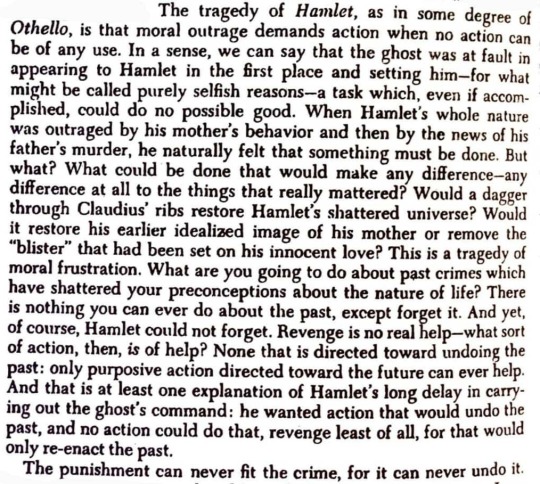
Absolutely insane lines to just drop in the middle of an academic text btw. Feeling so normal about this.
[ A Critical History of English Literature, Vol. 1, Prof. David Daiches, first published in 1960 ]
#william shakespeare#Hamlet#Hamlet meta#Shakespeare meta#critical role#critical role campaign 3#Bell's Hells#orym of the air ashari#critical role meta
35K notes
·
View notes
Text
Shakespeare: Juliet had no pulse no breath
Clowns: Why didn't Romeo just check for a pulse?!?!?!?!?!
Shakespeare: T-T
#i swear to goodness i'll never be over this#leave my boy alone#read the fucking play#shakespeare#william shakespeare#shakespeare meta#willy shakes#shakespeare aesthetic#romeo and juliet#benvolio#friar laurence#juliet#romeo rambles#romeo montague#romeo and juliet aesthetic
19 notes
·
View notes
Text
The Truth of Mankind…
…Is Also Dream’s
These quotes are from episode 5 (24/7):
“Garry dreams of proving his father he was wrong about him.”



“Kate dreams of running away where no one will find her.”


[But you do, and we see your star in so many panels of The Wake 🥺]



“Bette dreams of creating something that matters to people.”



You are the magician who became the man, Morpheus. And you are the king who left his kingdom, but not without making sure everyone else would be okay first--perhaps that is a different definition of a graceful ending, but it is graceful nonetheless.
You’re so painfully human, and yet, you are also not 😭
#the sandman#sandman#dream of the endless#morpheus#the sandman netflix#the sandman comics#sandman meta#sandman analysis#sandman character analysis#sandman spoilers#overture spoilers#mother night#father time#william shakespeare#the kindly ones spoilers#the wake spoilers#exiles spoilers#the tempest sandman spoilers#Garry Fletcher#kate fletcher#bette munroe
606 notes
·
View notes
Text
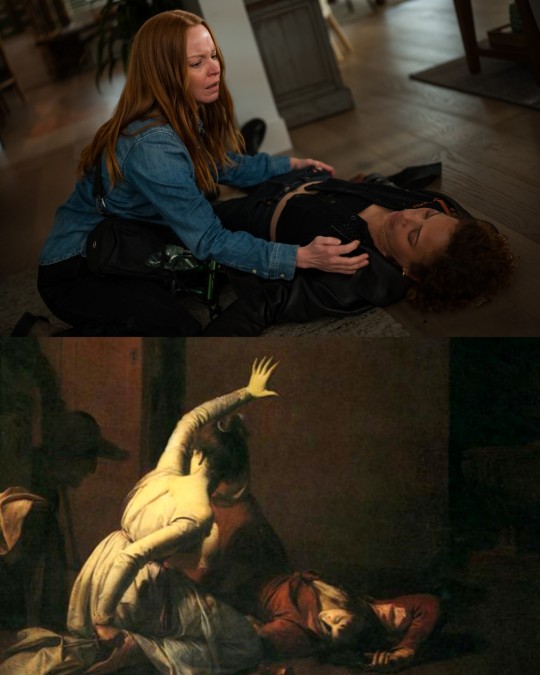
Van and Tai's whole relationship is so Romeo + Juliet - tragic star crossed lovers and all that. Even the (near death) by poison/toxic gas, being unconscious and then Van dying via dagger only to be discovered moments too late to save her. I guess within this comparison Melissa would be Tybalt, Simone is Rosaline, Misty is the Nurse obviously and teen Van is The Chorus, summarizing the tragic tale. There's also the speed at which they go from dating again in the adult timeline to Taissa calling Van her wife - all within the span of a few days.
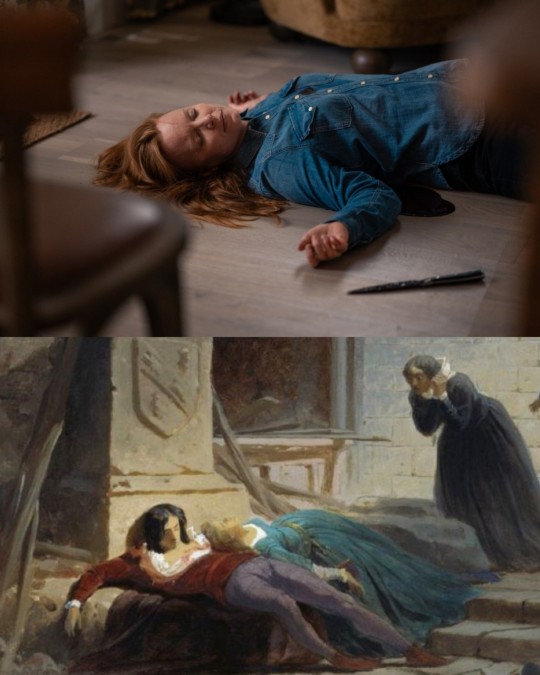
When Van went to the doctor I did notice it was shot similarly to the fish tank scene from the *1996* film Romeo + Juliet but assumed at most it was a nod to Vans love for 90s cinema but with the addition of the Hamlet poster behind Van in the cavefume classroom and her tragic, violent death (caused by a feud she wasn't really involved in but got swept up in anyway) and the use of the song "exit music for a film" by Radiohead which was on the soundtrack of R+J as well -I now believe this scene was foreshadowing for all the cinephiles like Van herself, that she was unfortunately doomed, and that Tai will most likely be the next Yellowjacket to die.
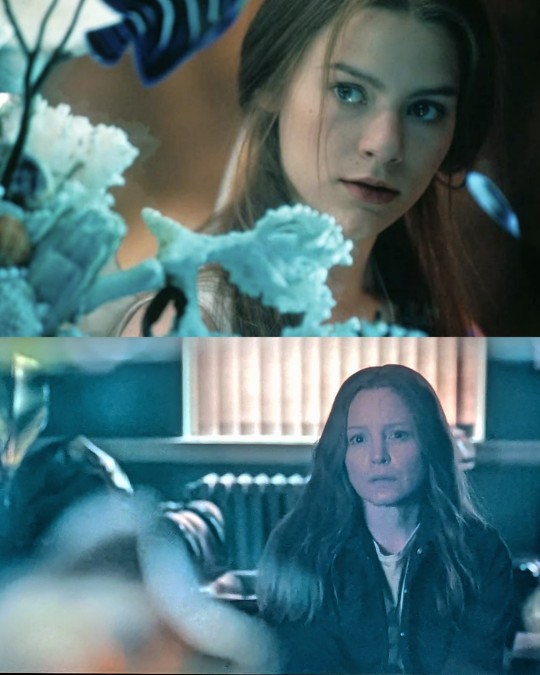
For never was a story of more woe, than this of Taissa and her Van ya know
#van palmer#lauren ambrose#taivan#taissa turner#yellowjackets#yellowjackets spoilers#yellowjackets meta#my post#hartanddoe#film/art connections#romeo + juliet#yellowjackets and Shakespeare#yj analysis#tawny cypress
80 notes
·
View notes
Text
Excellent analysis, never thought about it that way!
i am not in the Fandom so idk if this has already been established, and it's been a while since i did a reread, but
(and i have a migraine so bear with me)
at the end of Much Ado About Nothing, the Prince still doesn't have a wife, and I think that is his narrative punishment for being a credulous little misogynist.
Benedick talks a big "i hate marriage" game for half the play but when it comes down to the wire, he chooses to believe the women over the accusers Every Time, Immediately. and in the end he gets a wife who is his equal in every way and theyre obvs going to argue their way to enduring happiness all their lives.
(the wife is not his reward in a dehumanizing, objectifying way -- just that he Did The Work to become a better person, whicj make Beatrice reassess him as a potential mate and go "Yeah Ok")
Claudio talks a big "I love marriage and Hero" game but he falls for it every time someone suggests Hero might maybe possibly have looked at another dude for half a second. But when he's proven wrong, he publicly repents and agrees to atone by marrying Leonato's "other niece." So he gets a wife, too, but one who is going to hold this shit over his head for the rest of their lives.
Don John plays all these games just to fuck with them because game playing is the only power he has left. He doesn't get a wife, but he doesn't care, so whatever. not getting something he never wanted is not exactly a huge problem for him.
The prince makes two marriage proposals over the course of the play. To Hero, who he then gives to Claudio. And to Beatrice, who turns him down flat. Like Claudio, he believes the accusations against Hero. Unlike tiny baby Claudio, the prince is a grown ass man who should have the brains and the political skills to see through the whole charade. but he fails to clock the manipulation because he'd rather hop on the opportunity to trash Hero. He eggs on Claudio thru his revenge scheme. When Benedick confronts the prince and Claudio over Hero's "death", tiny baby Claudio is the one who starts to have doubts and guilt whereas the prince doesnt change his attitude until Boraccio is like "Yeah I totally snowed you guys."
Does the prince do any repenting after that. like Claudio? No. Does he offer any atonement to Leonato? No. And so, the prince, who wants a wife, remains sans wife at the end of the play because he hasnt done any of the work to deserve one, and also because out of all the villains in the play, he's the biggest one.
thus ends my very migrainey thinky thoughts about the prince
667 notes
·
View notes
Text
the Carrionites from the shakespeare code are really a fascinating concept to examine in light of The Post Salt-Line Era (disclaimer: i don’t like the episode as a whole for obvious reasons). powerful witches from the before-times, applying word-magic as a science. words that rhyme or sentences constructed with a specific intent have enough power to stop one of a timelord’s hearts and potentially open a space-time portal. something to keep in mind vis a vis the repeated wordsmithing motif we’ve got going on in s14: spoor “that’s a nice word”; smelted “i’ve never used that before”; ruby was was foundled “what a funny word, foundled”; semperdistans.
if ruby really is a changeling… much as to the carrionites (who were evidently modelled after historical witchcraft folklore), words hold tremendous power to the fae. that’s why there’s all this mythology of faeries “stealing names”: to them, there is no difference between signifier and signified, between a word and the real-life object that word represents, so a name is the person’s actual identity, their personhood itself.
therefore, if ruby really is a faerie child, it makes total sense for her to accidentally be affecting reality through verbal expression in the way she’s been doing throughout the whole series. in space babies, she mentions star trek and suddenly the crew appear in star trek esque uniforms. in the devil’s chord, she mentions strictly come dancing and suddenly they’re dancing opposite two strictly judges. obviously, her word-magic comes to a head in 73 yards: she reads out “i miss you” on the clifftop and the doctor disappears. she reads out “rest in peace, mad jack” and in 20 years gwylliam’s up there on the screen calling himself mad jack (we can presume the original note wasn’t about gwylliam, but an actual villager called jack). ruby speaking messages out loud manifests them into reality. she’s got faerie blood.
#doctor who meta#doctor who speculation#doctor who theory#dw meta#dw#doctor who series 14#ruby sunday#fifteenth doctor#russell t davies#wild blue yonder#the shakespeare code#ncuti gatwa#millie gibson#73 yards#space babies#the devil’s chord#changelings#fae#kate stewart#roger ap gwilliam#esquivalience#👁️#doctor who#the legend of ruby sunday#kitty.txt
240 notes
·
View notes
Text
idk i think its pretty cool that a lot of x reader fan/smut on tumblr (not all of it) is for the most part, can act as a reclaiming of pleasure for minorities (women, poc, lgbtqia+) in a world that largely creates literature and media that overtly fetishes us. like, we're imagining these "silly" lil licentious scenarios about fictional characters for funsies, yes, but also how cool is it that like, we're allowed to an even encouraged to express these desires that clearly also resonate with hundreds and sometimes thousands of other people, in a space that's not at all catered to the stereotypical "white male gaze"?
idk ppl can say what they want about x reader being cringe or whatever but just rmbr that dante alighieri wrote self-insert fanfic about his favorite writer leading him thru hell where he gets to then go and meet all his other favs, and then he gets to heaven where the girl he fell in love with (bc he met her literally only twice) was there to welcome him with open arms. like. yeah.
#🌧 raindrops#fanfic meta#LMFAO idk like every time i think about me having to read the inferno for that one italian literature class i laff#not bc it was bad it was rly good its a classic for a reason but then like during that class i would also be on my laptop#writing like x-reader bts fanfic and like ???? LMFAO IDK SEEMS SIMILAR TO ME HAHAHAHAH#also all of greek myth is fanfic. the world is in fact built on fanfic.#shakespeare is technically fanfic. he wrote his own versions of stories that already existed like he AU-ed his way into stardom#and i think that's beautiful#x reader
70 notes
·
View notes
Text
Why Aziraphale is an unreliable narrator
Part 2: The Story of wee Morag
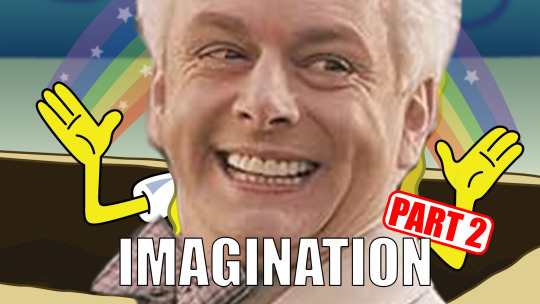
This is Part 2 of 3 total metas. Here are:
Part 1, in case you want to read about my analysis of the Story of Job first
and Part 3, in case you're impatient and want to jump ahead.
Fair warning though, for the sake of understanding some of the references, you're probably better off reading this chaptered meta chronologically. However, every part should work just as well as a standalone! I'll do my very best to make it so.
Alright, off or on you go beyond the cutty cut!
I'll start this second part off with a very brief summary of the main take aways and points from Part 1, which go as such:
Memory, as opposed to a third party's narration, is not a factual, objective retelling of a story or event. It's mingled and mangled with emotions, imaginations and exaggerations, projecting both the feelings and impressions you had back then as well as those you might have now in the present time back on whatever it is you are remembering. (Which is why we need to put everything that Aziraphale is remembering into the context of what he might have felt in the past, as well as what he's feeling right now.)
While this doesn't mean his (or anyone's) memories are lies, it does mean they're a very subjective and sometimes factually distorted representation of what actually happened, which, in our case, gives us a lot of subtext and a lot of not-there furniture to figure out and look at.
So, let's continue with S2E3 and the Story of wee Morag. We start our flashback with a scene of Aziraphale writing his diary entry on the 10th of November, 1827. Immediately, it's firmly established that this is once again not an outside-point-of-view narration, but rather what Aziraphale remembers and wrote down.
One thing that immediately stuck out to me here, is how helpful and kind Crowley is to Elspeth, pretty much from the very beginning when they meet her in the graveyard. Not only does he take on a Scottish accent so she won't perceive him as English (as she does with Aziraphale), but he also helps her drag the barrel that has the fresh body in it and, in the end, even pulls it all by himself while Elspeth simply follows behind them. Here's a rather poor-quality picture, for reference:
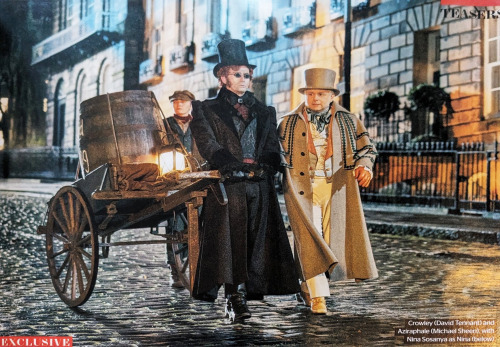
Now, we know that despite not showing it very often, Crowley has always been very fond of the humans and never really put himself on a pedestal simply because he's an immortal being himself. He likes humans, just like Aziraphale does. But, just like this story will tell us, Crowley knows that on top of liking humans, you can't just put them into boxes of good and evil and expect them to always do what is supposedly the "right" or "divinely good" thing to do. (Which is what differentiates him from Aziraphale in the way he understands and treats them, as we're shown in this minisode).
Him immediately and unspokenly helping Elspeth with dragging the barrel therefore might also be a first sign of a tiny projection from present day Aziraphale, as opposed to what Crowley might have actually done (probably just walked beside her, like Aziraphale) because he has the knowledge that Crowley really was so very kind to her in the end, wasn't he? And that he's kind to humans in general. ("Not kind! Off my head on Laudanum!" Sure, babe.)
Most of this minisode, in my opinion, is actually there to establish how Aziraphale's view of morality and good vs. evil used to be quite flawed and elitist –– and how Crowley has always been there to gently nudge him towards questioning his black and white view of heavenly right and hellishly wrong. That's why I think there's not as many hints in this minisode about Aziraphale's memories not being an accurate portrayal of what happened, as there are in the Story of Job or the magic show in 1941. (And, fear not, the latter will definitely be the most hint-heavy one). Alas, there's still a few bits and bobs in the Story of wee Morag that stuck out to me, that make a brief yet good case of the whole unreliable narration thing.
First of all: The way Aziraphale describes all of it in his diary is so different from the way we see him actually remembering it. It's almost like he tried to write this entry (and possibly all of his diary) as a bit of a thrilling short story, with himself as the main character. Which makes sense, given the fact that he adores books and would certainly be keen on dabbling in the art of capital-w Writing himself. It's yet again hinting at the fact that sometimes people (and angels) try to polish and bedazzle stories (and memories) to make them seem more exciting and adventurous, often to distract from the not-so-fun parts of it.
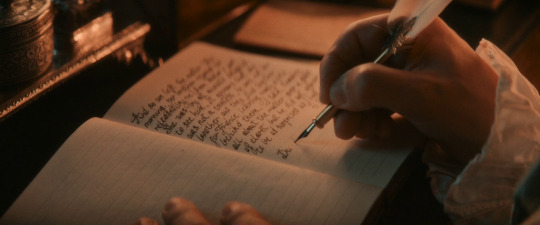
Like when Aziraphale's diary narrates:
"It was with heavy heart we arrived at Elspeth's destination. I was determined to thwart her monstrous plan!"
... and yet we see Crowley and Elspeth casually walking down the alleyway, very obviously not heavy-hearted in the slightest, while Aziraphale nervously scurries on behind them, very obviously not determined to thwart. (Timestamp-wise, it's around 17:38 in S2E3, in case you want to see for yourself.)
We get another cinematographic/auditory hint at the fact that Aziraphale's memory is heavily influenced by what he's feeling that very moment, when Dr. Mister Dalrymple –– FRCSE, thank you very much –– shows him the tumor he removed from the seven year old boy. You can see the shock and horror on Aziraphale's face once he learns of this child's cruel fate. We then proceed to hear Mr. Dalrymple's voice grow sort of echo-y and far away as the sad music swells up and drowns out his voice almost completely. It's awfully similar to what it feels like when really horrible news are broken to you and you dissociate and drift into a state of shock. Here's the clip of it, so you may listen for yourself:
It's clear that this is a very subjective portrayal of what Aziraphale is going through during this part of the memory. He's deeply horrified and saddened about the little boy having passed away so early in life – and we hear and feel this shock with him. Through him, because this is his memory. Whatever it is he's feeling and thinking, we're feeling and thinking it too because we're seeing it through his lense.
Another (less sad) hint at a possible exaggeration is the abnormally deep hole Crowley makes the two graveyard watch keepers fall into. I'm pretty sure he's very much in charge of his miracles, making this random slip-up seem a little silly – which is why I'm also pretty sure the "Might have slightly overdone it on that hole" is a wee bit of a meta hint at this just being another one of Aziraphale's dramatic bedazzlements of this story. For the *flings feather boa around neck* drama!
You know what else might be exaggerated? Hm, I dunno, maybe Crowley growing into the size of a tree for no apparent reason. Sure, yes, he's pretty high on Laudanum which is making him a bit loopy. But apart from that, it does seem an awfully big cinematographic euphemism for him being the metaphorical (and, once again, for the drama of it) literal bigger person in this scenario. He's the one who ends up saving Elspeth and who manages to secure a safe life without poverty and grave robbing for her. While Aziraphale was so tangled up in his own moral journey and main character-ism, missing that wee Morag was seconds away from death already, Crowley is the one who actually ends up growing stepping up for the human in need and saving them for good (pun intended).
In a way, it might just be Aziraphale's view of/feelings for Crowley in this very moment. Watching the demon outgrow what, according to Aziraphale's heavenly logic, is supposed to be a foul fiend, bestowing evil upon humanity – and growing into someone who does the exact opposite and saves Elspeth instead. Another larger-than-life character development, in Aziraphale's eyes. Literally.
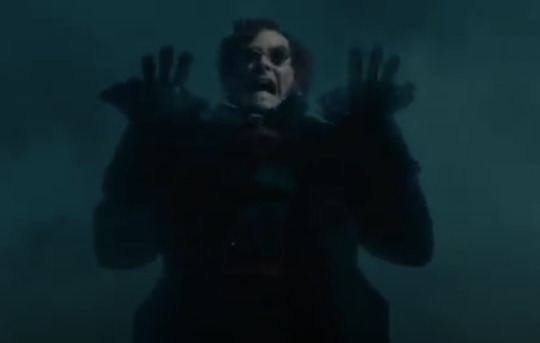
Let's switch back to the topic of the diary entry one last time, so I can make my final point of the this minisode's unreliable and a smidge over-dramatic narration of Dr. McFell. If you pay close attention, Aziraphale starts the entry we're all getting to experience with: "Last month, Crowley and I both happened to be in Edinburgh." Which means it didn't actually happen on the 10th of November, but rather at some point in October, 1827. Once we see Crowley get hydro-pumped back to Hell after rescuing Elspeth, the minisode ends with, presumably, the last sentence of Aziraphale's diary entry: "And that was the last I would see of Crowley for quite some time."
Take my hand and let's look at where the furniture isn't: This very clearly means that Crowley couldn't have been gone for more than a month, at best. Read again: "It happened last month and that was the last I would see of him for quite some time." This, albeit indirectly, clearly implies that when Aziraphale had sat down to write the diary entry, he had already run into Crowley again. Otherwise his phrasing would have probably been more along the lines of "... and I haven't seen Crowley since" or "... and Crowley has yet to return from wherever it is Hell's currently keeping him".
What's the point I'm trying to make? Good question. I guess my main point of storyteller Aziraphale being a bit over-dramatic in his narration is simply backed up by this, since A Single Month would barely pass as "quite some time" for an immortal being like him. And yet that's how he puts it, in his little Confidential Journals of A.Z. Fell, Vol. 603.
And another point that has absolutely nothing to do with the topic of this meta (but I'm still gonna make it 'cause this is my memory post): The meeting at St. Jame's Park in 1862 that so many, post-S2, took to be their first run-in after the Story of wee Morag, actually wasn't that at all. They saw each other at least once only a month later, as Aziraphale's diary lets us know. Which explains why he wasn't very surprised or concerned when he met Crowley in London, 1862. If there really had been 35 years in between those two events, the first one ending with Crowley being sucked back Downstairs to receive more than three decades worth of hellish punishment, wouldn't Aziraphale have been at least a tiny bit worried or more interested than:
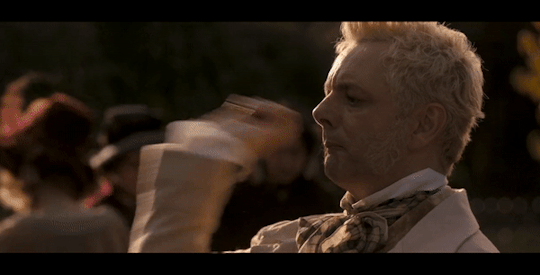
Just saying.
Alright, let's string this inflated hot air balloon of a post back together so we can outline some invisible furniture. This time with only two humble points:
Crowley through Aziraphale's lense Backed up by how we are introduced to Bildad the Shuhite in the Job minisode (suave, cheeky, smart, passionate in shoemaking and obstetrics), it's growing quite clear that Aziraphale's memories and impressions of Crowley are very fond and impressed ones. He sees him as someone who's not only witty, funny and cool, but also as someone who has figured out way sooner and faster than him that nothing's ever black and white. Not God's plans and not the human's choices either.
Aziraphale as a bit of an exaggerating adventure author With the direct parallel we get of inkslinger journalist!Aziraphale in the present day, it's quite apparent after this minisode that Aziraphale's memory is not only deeply influenced by his emotions, but that he also tends to have a bit of a dramatic touch to him. Although, you gotta give it to the guy: A month without seeing the love of your life, even if said life is eternal, can indeed seem like "quite some time".
Well, would you lookie here, we've reached the end of Part 2! What a journey it was. I hope you forgive me for the fact that I drifted off-course a few times. I just can't seem to reel in my silly little observations, even if they've got nothing to do with the point I'm trying to make. But hey, doesn't that just make me a little bit like Aziraphale's storytelling, in a way?
I'll let you be the judge of that.
See you in Part 3! And in case you haven't snuck a peak yet: here's Part 1 again.
Ta!
#good omens#good omens season 2#gos2#go2#good omens 2#good omens meta#ineffable husbands#aziraphale#crowley#good omens analysis#aziraphale is a storyteller#but not a very accurate one#story of wee morag#my own meta#aziraphale the Drama Queen#shakespeare who#unreliable but beloved story teller aziraphale
566 notes
·
View notes
Text
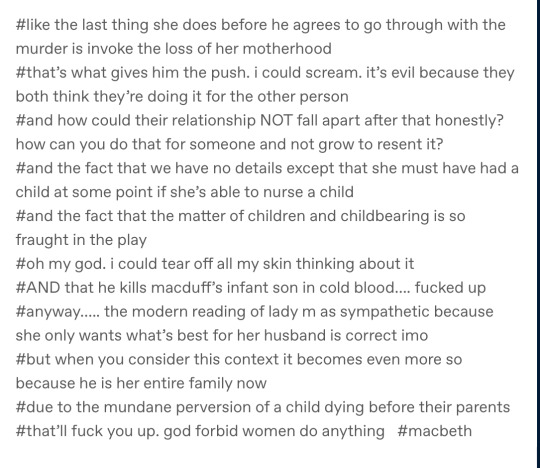
Tags by op @devilsskettle
thinking about the way that lady macbeth convinces macbeth to kill duncan and yeah she talks about power and cowardice and what he owes to himself and to her, but at the heart of the whole thing is how their child died and she has nothing else to pin her hopes for the future on. unfortunately the fact that they no longer have an heir is also the driving force behind macbeth’s violent paranoia toward banquo which ultimately dooms them
#macbeth#lady macbeth#shakespeare#shakespeare meta#the most vulnerable king is the one with no heir#and with no heir he has nothing to lose
91 notes
·
View notes
Text
idk if it's been talked about before but suzanne collins never misses a BEAT when it came to names, specifically coriolanus snow and dr volumnia gaul. just from their first names alone you can already guess what type of role might play between them (well... if you've read shakespeare's coriolanus that is. i do recommend it btw).
a lot of bits were taken from shakespeare's play for tbosas like the motif with scars / wounds / the body as being a microcosm of the nation, the common people fighting up against the government, coriolanus' hatred of the common people wanting to be "equal" to him, the rebel arc etc etc but i'm soooo so so interested in the fact that dr gaul was named volumnia and coriolanus is coriolanus because in the play, coriolanus' mother's name is volumnia!
volumnia is arguably the only female character in the play that has any depth (i am so sorry virgilia). his mother shapes her son into the warrior he is. she reminds him at every turn that he is nothing more than a weapon to be wielded. in fact, she's the one who gets her son to come back from his "revolt" against rome which ultimately lead to his demise. this parallels tbosas in the same way because dr gaul took coriolanus and molded him into the villain you would see in thg trilogy. she brought him back from d12 and then brought about the end of his humanity (a death, so to speak—at the end of the book he said something similar to this to try to save himself from lucy gray's suspicions but he was right because he did kill a part of himself to be where he is)! coriolanus snow's mother is present but off-page. her ghost haunts him, comforts him, but the 'mother' figure is the ever-present, all-knowing dr gaul.
UGH! like with just their names you could map out where they end up at the end of the story and that's literally insane. like the caliber of writing is literally next to none fr
#lit#the hunger games#the ballad of songbirds and snakes#coriolanus snow#volumnia gaul#meta#text#tais toi lys#thgpost#yet again the mf that fixates on names and shakespeare talks about names and shakespeare what can i say i'm predictable#ALSOOOOOOO. shakespeare's coriolanus' name isn't even coriolanus. it's caius martius but it's only when he helped deafeat corioles that he#earns the name coriolanus. it's a neat parallel that coriolanus didn't really “earn” the snow name until he became a villain.#anyway i'm just spitballing#*
466 notes
·
View notes
Text
Holy Palmers Kiss
Throughout their history together, the romance between Aziraphale and Crowley has mostly been expressed through incredibly subtle ways. It's been centuries (if not millennia) of nothing more obvious than a surreptitious brushing of hands or yearning looks when they think no one is watching. And of course, when they have plenty of deniability.
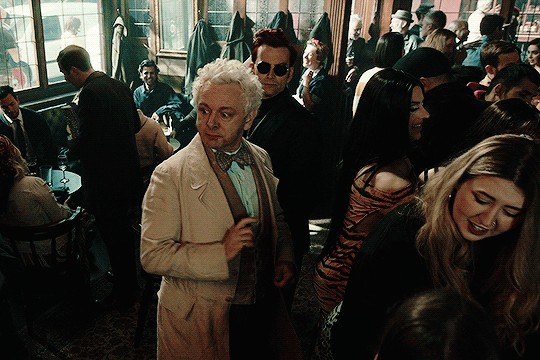
Good work, Aziraphale... hand on the chest of the Thin Dark Duke, and if anyone asked, you were just making sure that young lady didn't get bumped.
And this is for a very good reason. It quite literally isn't safe for them to be openly romantic with one another, even now. Demons like Hastur and Shax are constantly popping up... Michael and Uriel are always watching... eyes are everywhere.
They have certainly gotten closer to being open in the years that separate the two seasons. Crawley sprawls all over that bookshop like he has a personal vendetta against chairs - removes his glasses as soon as he steps foot inside (which is an incredibly coded action that I would love to take a more in depth look at in the future) - gives up the keys to the Bently... And Aziraphale himself has those longing looks - calls him up to talk enough that Crowley knows his "tones of voice" - and then, we get The Ball.
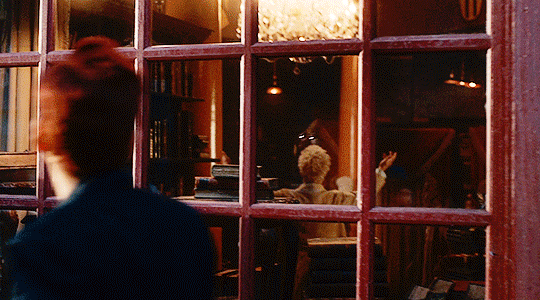
Technically, The Ball is for Nina and Maggie... or at least that's what Aziraphale says. We get the lovely little moment in the pub where he and Crowley try to come up with the best ways to get humans to fall in love with each other. But the moment Aziraphale mentions Jane Austen having characters dancing with each other and realizing how in love they were, I think at least for him the focus changes to this... THE BALL IS FOR CROWLEY. And once he starts giving away books to make sure the ball will be perfect, there can be no question. The entire idea is a way for him to be able to dance with Crowley.

That's why, for me, the most romantic moment in all of Good Omens, at least from Aziraphale's point of view, is this moment right here.
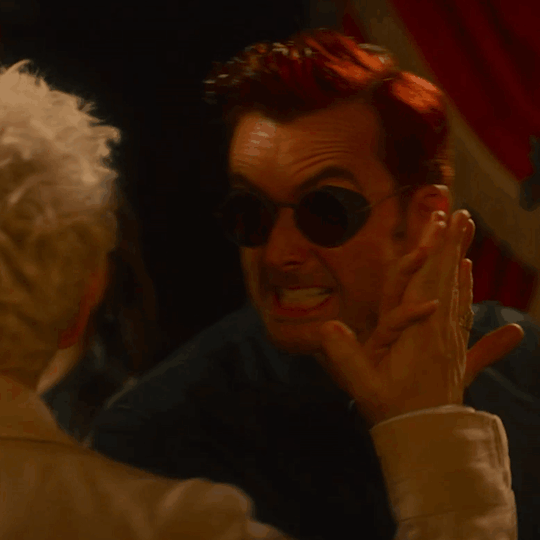
Vavoom! Sorted! Look at the way Crowley even curls his fingers around Aziraphale's hand! This is peak Aziraphale romance as a fan of Jane Austen.
But he's also a fan of Shakespeare. Even the gloomy ones. And every time I watch this scene, I'm reminded of a different ball from one of the gloomy plays that Crowley would hate and Aziraphale would swoon over. Romeo and Juliet. A fitting parallel to an angel and a demon being in love.
In Romeo and Juliet, at the end of the first act, is another ball. Romeo tries to get Juliet to kiss him, and she turns him down with this...
"For saints have hands that pilgrim's hands do touch/ And palm to palm is holy palmer's kiss"
There's quite the back and forth here between Juliet and her Romeo about hands and lips and such, (and eventually Romeo gets his way) but the parallel for Aziraphale in this exchange is unmistakable. He, as the angel, is the saint (and stand in for Juliet), Crowley his pilgrim. Snogging in public would be absolutely out of the question for our dear prim and proper Aziraphale... but this is a chaste kiss, and one that he is showing the world. A public declaration of his love for Crowley. A Holy Palmer's Kiss.

It's certainly debatable if Crowley would have picked up on it. Like a lot of their coded language there are times when one of them misses what the other is trying to say. But in my opinion, this was not only a public declaration, but his confession to Crowley. This is his "I love you" as much as "I forgive you" is.

Just for fun, here's how Romeo finally gets his kisses (but let's have Crowley stand in for Romeo and Aziraphale for Juliet, shall we?)
Cro. Thus from my lips, by yours, my sin is purged. (They kiss)
Azi. Then have my lips the sin that they have took.
Cro. Sin from my lips? O trespass sweetly urged. Give me my sin again. (They kiss again)
#good omens#ineffable husbands#aziraphale#crowley#good omens meta#aziraphale loves crowley#crowley loves aziraphale#good omens 2#the ball was for crowley#aziracrow#shakespeare references in Good Omens
349 notes
·
View notes